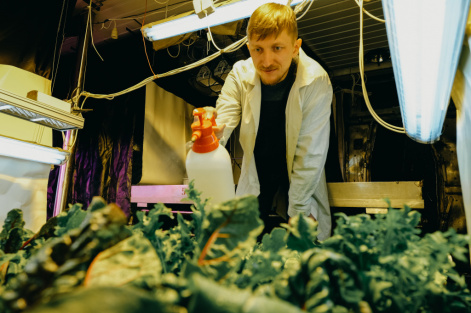Two new youth laboratories have been created in the Krasnoyarsk Science Center
8 October 2021 г. FRC KSC SB RAS

This year Krasnoyarsk has become one of 15 winners of the competition for the creation of world-class scientific and educational centers. Creating a network of world-class scientific and educational centers is one of the tasks of the national project "Science". The goal of the country's first climatic research and educational center "Yenisei Siberia", created in Krasnoyarsk, is to become world scientific and technological leaders in key sectors of the economy of the Yenisei Siberia and to solve problems of social development of territories.
Within the framework of the project two youth laboratories have been created at the Federal Research Center "Krasnoyarsk Science Center SB RAS". The new laboratories will be engaged in research and development of processes of the cycle of matter in closed ecosystems, as well as in monitoring and regulation of greenhouse gas flows. The share of young scientists in the laboratories should be no smaller than 85%.
At the Institute of Biophysics, the Laboratory for Problems of Creation of Circular Processes of Artificial Ecosystems has been established. The head of the laboratory is Sergey Trifonov, Candidate of Biological Sciences. The main task of the laboratory will be to carry out research related to the development of biological and physicochemical methods for the disposal and processing of organic waste, as well as to completely closed human life support systems with a full cycle. Such systems are expected to be used for creating comfortable and optimum conditions for life on other planets or in ecological and energetically autonomous residential complexes in the Arctic or in other hard-to-reach areas.
“The laboratory will deal with fundamental problems. First, the creation of a series of experimental setups, ecosystems with a high level of isolation, the creation of a miniature model of the biosphere, because it simulates the circular part. There also arises another goal, namely, finding ways to control the circulation. There are also plans to study two possible mechanisms for closing the system and search for answers to the questions which remain open but important for the creation of closed systems: finding ways to enhance the oxidation rate of organic matter for the disposal of organic waste and to increase the availability of mineral elements to be involved in artificial ecosystems in the cycle process ”, - says the director of the Institute of Biophysics SB RAS, Academician of RAS, Doctor of Physical and Mathematical Sciences, Andrey Degermendzhi.
The work of the new laboratory will continue the long-term research carried out at the Institute of Biophysics SB RAS in the field of creating life support systems, in particular, this refers to the synthesis of organic matter to be included in the life support system cycle.
"The laboratory was established for studying the processes which ensure the closure of the biosphere, including the processes of recycling organic waste. In general, the new laboratory continues research on artificial ecosystems and together with the laboratory of phototrophic biosynthesis control, it will develop this direction in order to create the system Bios-4 and conduct full-fledged multi-month experiments with human participation, "explains Sergey Trifonov.
The Laboratory of Experimental and Applied Ecology has been created at the V.N. Sukachev Institute of Forest and Aleksey Panov, Candidate of Biological Sciences, has become its head. The tasks of the laboratory will include the development of a network for measuring greenhouse gas fluxes and the assessment of carbon stock changes, the creation of GIS and the formation of strategies for remote monitoring of climatically active gases, as well as the development and field testing of sequestration technologies aimed at reducing emissions and increasing the absorption of climatically active gases.
Climate change and greenhouse gas emissions affect not only ecology, but also economy, pricing, food supply and relations between countries. At the same time, studies of emissions are performed on a small amount of material and, as a result, do not reflect the regional specifics of carbon stocks. In this regard, there is an urgent need to develop modern instrumental methods for timely monitoring and calculation of the absorption capacity at the regional and federal levels.
“To solve this problem, a project has been launched in Russia in 2021 for creating a network of carbon polygons, which would make it possible to develop our own method for calculating the absorption of climatically active gases. The key point in this program is the combination of direct measurements of the carbon balance of ecosystems, remote sensing data and use of dynamic models for the detailed assessment of trends in the long-term carbon changes under various environmental management scenarios. Currently, the National Council has approved 14 carbon polygons in various constituent entities of the Russian Federation.
Krasnoyarsk has not yet been included in this program, but the development of a network for experimental monitoring of the exchange fluxes of greenhouse gases created at the V.N. Sukachev Institute of Forest SB RAS, and participation REC "Yenisei Siberia" should become the basis for solving the fundamental problem of assessing the parameters of metabolic processes in natural and anthropogenically modified ecosystems. The applied component of the laboratory's research will be aimed at developing technologies for increasing the long-term storage of climatically active gases, which can be used in the Krasnoyarsk Region, Republic of Khakassia and Tyva,” emphasizes Natalya Kuzmik, Candidate of Biological Sciences, Scientific secretary at the V.N. Sukachev Institute of Forest.
The scientific plans of the new laboratories are directly related to the main goals of the Yenisei Siberia project; these laboratories are to become a center for the development of new technologies in the field of ecology and a growth point for a new post-carbon economy in Russia.
Share:
